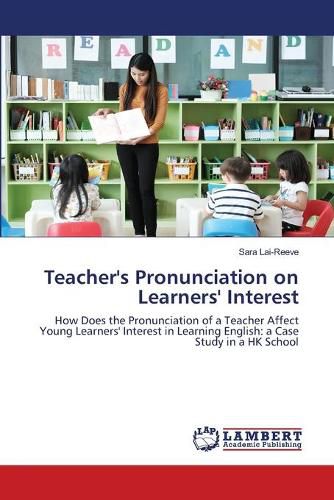Readings Newsletter
Become a Readings Member to make your shopping experience even easier.
Sign in or sign up for free!
You’re not far away from qualifying for FREE standard shipping within Australia
You’ve qualified for FREE standard shipping within Australia
The cart is loading…






This title is printed to order. This book may have been self-published. If so, we cannot guarantee the quality of the content. In the main most books will have gone through the editing process however some may not. We therefore suggest that you be aware of this before ordering this book. If in doubt check either the author or publisher’s details as we are unable to accept any returns unless they are faulty. Please contact us if you have any questions.
This descriptive case study probes into the effects of a local Hong Kong Chinese kindergarten teacher’s pronunciation on her students’ classroom interactions in English language learning. It also describes and examines the teacher’s own perceptions of pronunciation competency as a language professional. In Asia, many non-native L2 teachers suffer from the native-speaker fallacy due to our historical and colonial backgrounds. A huge inferior complex element is still deeply entrenched in our cultures. This study aims to explore how we can change this imbalanced and misperceived self-worth among language teachers and tap into the rich resources from our L1 & L2 learning experiences into our current teaching experiences. To draw a compare and contrast model, two kindergarten teachers (Native English Speaker (NS) & Non Native Speaker (NNS)) with 36 young learners (K3) were interviewed and observed. Though the initial results show the non-native pronunciation of the teacher negatively affected or confused students’ interactions in English language learning, this study has raised an awareness to address the generally non-RP standards of kindergarten teachers in Hong Kong.
$9.00 standard shipping within Australia
FREE standard shipping within Australia for orders over $100.00
Express & International shipping calculated at checkout
This title is printed to order. This book may have been self-published. If so, we cannot guarantee the quality of the content. In the main most books will have gone through the editing process however some may not. We therefore suggest that you be aware of this before ordering this book. If in doubt check either the author or publisher’s details as we are unable to accept any returns unless they are faulty. Please contact us if you have any questions.
This descriptive case study probes into the effects of a local Hong Kong Chinese kindergarten teacher’s pronunciation on her students’ classroom interactions in English language learning. It also describes and examines the teacher’s own perceptions of pronunciation competency as a language professional. In Asia, many non-native L2 teachers suffer from the native-speaker fallacy due to our historical and colonial backgrounds. A huge inferior complex element is still deeply entrenched in our cultures. This study aims to explore how we can change this imbalanced and misperceived self-worth among language teachers and tap into the rich resources from our L1 & L2 learning experiences into our current teaching experiences. To draw a compare and contrast model, two kindergarten teachers (Native English Speaker (NS) & Non Native Speaker (NNS)) with 36 young learners (K3) were interviewed and observed. Though the initial results show the non-native pronunciation of the teacher negatively affected or confused students’ interactions in English language learning, this study has raised an awareness to address the generally non-RP standards of kindergarten teachers in Hong Kong.